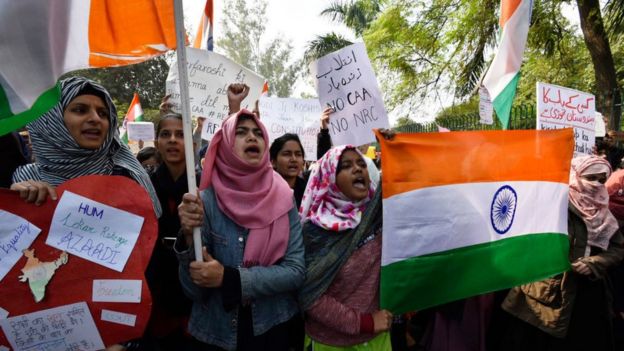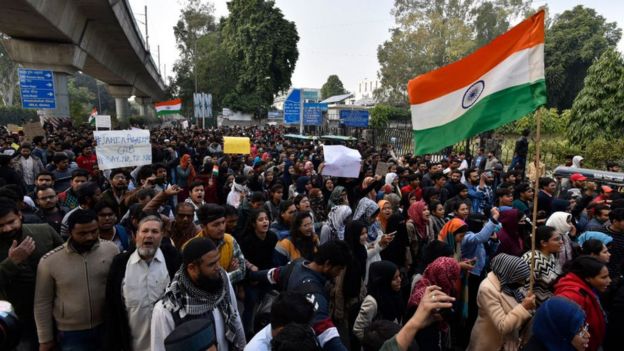Protests over a controversial new law on migrants are raging across several Indian cities, prompting police to clash with demonstrators.
The new law entitles non-Muslim migrants from three Muslim-majority countries to citizenship if they are facing religious persecution.
Police used tear gas and detained protesters in the capital Delhi as buses were torched and roads blocked.
Protests have raged across northern and eastern India since the law was passed.
Internet services have been shut down in several cities where protests are taking place. Universities across the country have resumed demonstrations on Monday.
A massive demonstration against the law has also begun in West Bengal state, led by Chief Minister Mamata Banerjee and her ruling Trinamool Congress party.
Tens of thousands of people are expected to participate.
Some critics say the law is anti-Muslim, while others – especially in border regions – fear large-scale migration.
Six people have been killed in the five days of unrest.
Several lawyers asked the Supreme Court to intervene, pointing out that officers had assaulted students in bathrooms, but the chief justice said that the court would not take any action until students ceased their protests.
The UK, US and Canada have issued travel warnings for people visiting India’s north-east, telling their citizens to “exercise caution” if travelling to the region.
What is happening in Delhi?
On Monday morning, protests resumed in Delhi’s prestigious Jamia Millia Islamia university after students held a march which ended in clashes with the police on Sunday.
Around 35 students were detained by police on Sunday and released early on Monday morning.
The university’s vice-chancellor, Najma Akhtar, condemned the police action on Monday and told reporters that they would be filing a court case against the police and demanding a high-level inquiry.
She also denied rumours of student deaths.
It is still unclear who started the violence but stones were thrown at the police who retaliated with tear gas.
Local media reported that nearly 60 people, including students and police, were injured. At least three buses and several motorcycles were set on fire.
Students distanced themselves from the violence and some police officers privately admitted that local troublemakers were behind the trouble, the BBC’s Kinjal Pandya reported.

The university said police later entered the campus without permission and video footage showed police assaulting students and staff.
Videos shot by students show police beating up students inside campus areas like bathrooms and the library.
Police have said that they did what was “necessary” to stop the protests.
Some schools in southern Delhi have been asked to remain closed on Monday.
Hundreds of people also protested in other parts of the city, including in Jawaharlal Nehru University and outside the city’s police headquarters.
What did the Supreme Court say?
“Public properties are being destroyed, buses are being burned. We will take cognisance, but all this has to stop,” Chief Justice Sharad Bobde said.
He added that the court was not against the peaceful demonstration, but that “this atmosphere must settle down”.
“If protests and violence continue, we will not hear a case on this.”
The chief justice also criticised the student protesters, saying that they could not “take the law into their own hands”.
“The court can’t do anything right now. Let the riots stop,” he said.
What has the reaction been in other Indian cities?
Live footage from the northern city of Lucknow on Monday showed students at Nadwa university throwing stones at security forces, who retaliated by throwing the stones back at them.
The students have been locked inside the campus.
Local television footage also showed officers hitting students with large sticks.
The situation remains tense and more protests are expected. Students at the prestigious Indian Institute of Technology in the southern city of Chennai (formerly Madras) have already announced a protest this afternoon.
And students in Delhi University have announced that they are boycotting examinations in solidarity.
What happened on Sunday?
On Sunday, hundreds of students across Indian cities came out in support of those protesting in Jamia Millia Islamia.
In the northern city of Aligarh, students of Aligarh Muslim University clashed with police, prompting the university to close down the campus until 5 January.

A large protest also broke out in the southern city of Hyderabad, as students of Maulana Azad Urdu University carried slogans against the police action in Delhi.
In India’s financial capital, Mumbai, students of the Tata Institute of Social Sciences held a candlelit march.
Some students in Delhi also alleged that police sexually harassed and assaulted students on Sunday.
Students in other cities like Varanasi and Kolkata also held marches in solidarity throughout Sunday.
Why is the law so divisive?
The law allows non-Muslims from Bangladesh, Pakistan and Afghanistan, who entered India illegally, to become citizens.
The Hindu-nationalist BJP government argues that the law aims to accommodate those who have fled religious persecution.
Critics say the law is part of the government’s agenda to marginalise Muslims, and that it violates secular principles enshrined in the constitution.
Earlier this week the United Nations Human Rights office voiced concern that the new law was fundamentally discriminatory in nature.
The government denies any religious bias and says Muslims are not covered by the new law because they are not religious minorities, and therefore do not need India’s protection.
Meanwhile, people in Assam fear that they will be “overrun” by illegal non-Muslim migrants from neighbouring Bangladesh.
They argue that outsiders will take over their land and jobs – eventually dominating their culture and identity.
The protests in Assam have little to do with concerns about the exclusionary nature of the law and the threat to secularism.
They have more to do with indigenous fears about being demographically and culturally swamped by “outsiders”.
Source: BBC




















































